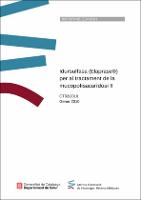| dc.contributor | Departament de Salut |
| dc.contributor.author | Comitè d’Avaluació de Medicaments d’Ús Hospitalari (CAMUH) |
| dc.date.accessioned | 2014-09-30T11:45:33Z |
| dc.date.available | 2014-09-30T11:45:33Z |
| dc.date.issued | 2010-01 |
| dc.identifier.citation | Comitè d'Avaluació de Medicaments d'Utilització Hospitalària (CAMUH). Idursulfasa (Elaprase®) per al tractament de la mucopolisacaridosi II. Barcelona: Agència d’Avaluació de Tecnologia i Recerca Mèdiques; 2010. |
| dc.identifier.other | CT;02/2010 |
| dc.identifier.uri | https://hdl.handle.net/11351/842 |
| dc.description | Hunter syndrome; Mucopolysaccharidosis type II; Idursulfase |
| dc.description.abstract | Background
Hunter syndrome or type II mucopolysaccharidosis (MPS II) is a lysosomal storage disease
caused by iduronate-2-sulfatase (I2S) deficiency, an enzyme involved in the metabolism of
glycoaminoglycans. It is a rare recessive hereditary disorder linked to chromosome X that
mainly affects children. The current therapeutic approach to MPS II is based on
multidisciplinary intervention. Idursulfase (Elaprase®) is a recombinant form of the I2S
human enzyme, approved by the European Medicines Agency (EMEA) in January 2007 for
the long term treatment of patients with MPS II.
Objectives
To assess the efficacy, safety and efficiency of idursulfase versus any other treatment
alternatives, including placebo, in patients with MPS II.
Methodology
A systematic search of the scientific evidence up until March 2009 has been conducted in the
primary biomedical databases. Clinical trials that assess the efficacy and safety of
idursulfase versus any other treatment alternatives, including placebo, in patients affected by
MPS II, have been selected. The internal validity of the studies included was assessed by
two independent reviewers in accord with the criteria proposed by the Scottish Intercollegiate
Guidelines Network (SIGN).
Results
The primary efficacy and safety data of idursulfase have been derived from a phase II/III
double blind randomised clinical trial (pivotal study) that compares two idursulfase dosages
(0.5 mg/kg every week or 0.5 mg/kg every two weeks) with placebo over the course of one
year in 96 patients with MPS II; and from a phase I/II non-comparative support clinical trial.
The results of the pivotal study suggest an improvement of the combined primary variable
(six-minute walk test-forced vital capacity; 6MWT-FVC) in patients treated with idursulfase.
Patients who received a weekly dosage experienced a modest, yet statistically significant,
improvement in the mean distance walked without help at six minutes, versus placebo (36.7
m more at twelve months). A significant reduction in GAG excretion in urine, liver volume and
spleen volume was observed, in addition to an increase in the absolute value of FVC in
patients treated with idursulfase, but not in the other variables analysed.
The most frequent adverse events were fever, headaches, coughing, pharyngitis, upper
respiratory infections, nasal congestion, nausea and vomiting, abdominal pain and diarrhoea.
In most cases these side effects were mild or moderate. The adverse reactions associated
with perfusion are the most frequent adverse events possibly related with the administration of idursulfase. Two deaths have been reported in the pivotal study (one in the placebo group
and one in the weekly dosage group). Nearly half of all patients treated with idursulfase have
developed IgG antibodies against the drug.
The only data available on the cost-effectiveness of idursulfase in patients with MPS II stem
from a secondary source. According to this source, the incremental cost-effectiveness ratio
of idursulfase when compared to base treatment is 564.69 pounds per quality-adjusted life
year.
Conclusions
Idursulfase has demonstrated short term efficacy in patients with non-advanced forms of
MPS II when compared to placebo. However, the clinical relevance of these results is
unknown. No evidence has been published on the benefits of idursulfase in terms of quality
of life. |
| dc.language.iso | cat |
| dc.publisher | Agència d'Avaluació de Tecnologia i Recerca Mèdiques |
| dc.rights | Atribución-NoComercial-SinDerivadas 3.0 España |
| dc.rights.uri | http://creativecommons.org/licenses/by-nc-nd/3.0/es/ |
| dc.source | Scientia |
| dc.subject | Mucopolisacàrids |
| dc.subject | Malalties hereditàries - Tractament |
| dc.subject | Medicaments - Assaigs clínics |
| dc.subject.mesh | Mucopolysaccharidosis II |
| dc.subject.mesh | Genetic Diseases, Inborn |
| dc.subject.mesh | Clinical Trial |
| dc.title | Idursulfasa (Elaprase®) per al tractament de la mucopolisacaridosi II |
| dc.type | info:eu-repo/semantics/report |
| dc.identifier.dl | B. 23220-2010 |
| dc.subject.decs | mucopolisacaridosis II |
| dc.subject.decs | enfermedades genéticas congénitas |
| dc.subject.decs | ensayo clínico |
| dc.type.version | info:eu-repo/semantics/publishedVersion |
| dc.audience | Professionals |
| dc.rights.accessrights | info:eu-repo/semantics/openAccess |

